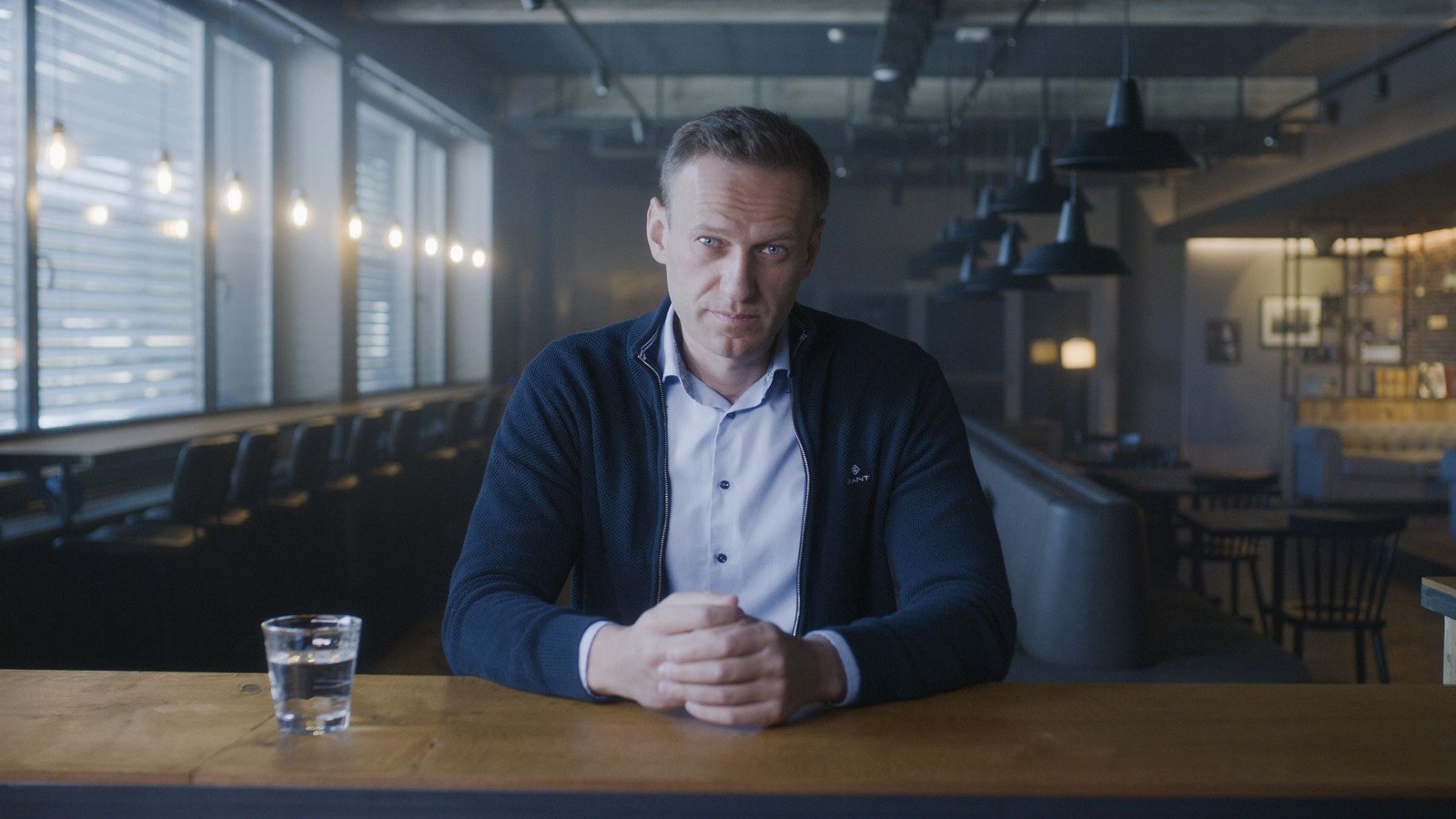Navalny: Portrait of an Enemy of Tyranny, and the Unraveling of a Political Poisoning
By Liam Lacey
Rating: B+
Daniel Roher, the 29-year-old Canadian filmmaker behind the authorized 2019 documentary Once Were Brothers, Robbie Robertson and the Band, makes a significantly more high-profile and timely documentary with Navalny, a portrait of the anti-Putin dissident and anti-corruption activist, Alexei Navalny.
The film, which won the U.S. Documentary Competition Audience Award and the Festival Favorite Award, airs on CNN Sunday night (April 24) and screens April 30, May 2 and May 7 at the upcoming Hot Docs festival.
Though it’s impossible not to see the documentary as a kind of prequel to Russia’s invasion of Ukraine, on its own, Navalny is a lively, absorbing mix of original and archival footage with elements of real-life thriller set against the backdrop of the current disinformation wars.
Instead of presenting Navalny’s entire biography, Roher’s film focuses on its most dramatic episode of Navalny’s poisoning, evacuation to Germany, and voluntary return to Russia, where he is currently in prison.
In August 2020, when Navalny was flying from Siberia back to Moscow, he suddenly became deathly ill. The plane made a detour landing in Omsk, where he was hospitalized. Though police tried to keep his wife, Yulia Navalnaya, and friends away from the patient, she eventually succeeded in getting him moved to a hospital in Germany where doctors determined he had been poisoned. The toxin: the Soviet-developed nerve agent Novichok, which has previously been used to poison opponents of the Russian government.
While in Germany, Navalny was contacted by the Netherlands-based investigative collective Bellingcat, and its Bulgarian executive director Christo Grozev, who had a lead on the assassination attempt. Roher had met Grozev on another uncompleted project, and was introduced to Navalny as a collaborator.
Bellingcat, named for the old fable about mice who want to put a bell on a cat, is an open-source investigative journalism group using mostly publicly available data, including social media, flight manifests, and phone and car records, to combat disinformation and solve state crimes.
The Navalny case was one of their more spectacular investigative triumphs, chronicled in Eliot Higgins’ 2021 book, We Are Bellingcat. Grozev and his team establish exactly how and when Navalny was poisoned through underwear returned from a laundry. They also exposed a unit of 20 or more assassins working for Russia’s Federal Security Service, the successor to the KGB, and narrowed the assassination attempt down to a specific agent, Konstantin Kudryavtsev.
This is the set-up for an amazing scene with Navalny, posing as a senior Russian bureaucrat investigating the failed operation, reaching his would-be killer on the phone.
Bellingcat collaborated with CNN, the producer of this documentary, and in one scene, we see CNN’s Clarissa Ward showing up at assassin’s apartment door on the outskirts of Moscow.
Not only was the Russian spy agency exposed as killers, they looked like bumbling idiots. Russian television (which always seems to look like an uncanny mirror image of FOX News) attempted to dismiss Navalny as a drug user and sexual deviant. When asked about the case, Putin, oozing contempt in his annual press conference, refused to say Navalny’s name.
For his part, Navalny is a highly skilled media influencer. And to some degree, this film is part of his outreach. His YouTube channel has millions of views and he, somehow, continues to send long Twitter threads from prison.
Arguably, this documentary is an extension of that media reach: The film shows Navalny with his wife, young son and college-age daughter feeding donkeys, playing with TikTok, and juggling lemons in his kitchen. We see him inspiring crowds and charming the press with his speeches and through his courage in returning to Russia.
In retrospect, it’s noteworthy that Navalny’s father is a Ukrainian who witnessed Russia’s deadly suppression of information after the Chernobyl nuclear disaster.
Some critics have expressed doubts about the West’s desire to treat Navalny as a Nelson Mandela-like hero. They point out that he has, in the past, expressed anti-immigrant views and shared stages with Russian nationalist extremists.
In a direct one-on-one interview near the end of the film (which appears to be set in an empty bar), Roher asks Navalny to justify some of his associations from a decade ago. Bristling at what he characterizes as the usual superficial questions from Western journalists, Navalny says that when one has foes such as Putin, one can’t be choosy about one’s allies.
That’s plausible, though you might wish that Roher would have drilled down harder on what Navalny stands for, rather than what he’s against.
At its core though, Navalny is an inspiring film. Not only does it provide an example of a courageous opponent of tyranny but it serves as an example of how, through diligent collaboration, the lies of the powerful can be challenged and demolished.
Navalny. Directed by Daniel Roher. Airs April 24 on CNN and screens at Toronto's Hot Docs Festival April 30, May 2 and May 7.


